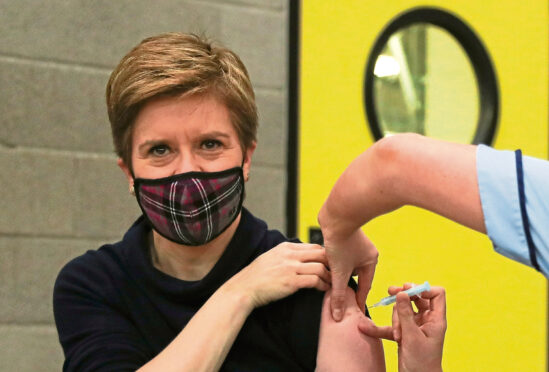
Nicola Sturgeon urged Scots to get their boosters yesterday to reduce the impact of Omicron after getting her third jag.
The First Minister, who said she hoped to avoid further restrictions but refused to rule them out, said: “It is critically important for everybody who is eligible to come forward and get a booster as soon as possible.
“We know that booster jags significantly increase the amount of protection that you get so it’s not marginal, it is really significant.
“And that would always have been important as we head into winter but with the new Omicron variant it’s even more important.
“There’s lots of talk about whether vaccines will be less effective against Omicron. We don’t know that yet. But it’s really important to stress that, even if that were the case, less effective does not mean ineffective.
“You’re still going to have so much more protection if you have a vaccination, including your booster, than you will have without that.”
There were 30 Omicron infections yesterday, up one from Friday, including several linked to a Steps concert in Glasgow last month, but Sturgeon, who got her booster and flu jag at a vaccination centre in Easterhouse, warned numbers could rise sharply in the days ahead as there was now community transmission in Scotland.
Cases of the new variant have so far been recorded in the Greater Glasgow and Clyde, Lanarkshire Highland, Grampian and Forth Valley health boards.
While the potency of the new variant is still being studied, there is concern that, by the time scientists have established how serious it is, it may be too late to slow the spread of a strain that may risk overwhelming the NHS.
The First Minister said she was also prepared to take unpopular decisions in the run-up to Christmas if necessary. She said: “I hope we don’t have to introduce any further protections in addition to those we have in place right now, but we can’t rule anything out.”
Professor of public health Linda Bauld, who is a Scottish government adviser, said Christmas parties should not be cancelled but those attending should take a Covid test first.
She said: “Quite frankly, most things are open. People need to get on with their lives. Not just younger people, but they have suffered a lot from the indirect harms.
“So I think it’s unreasonable to say to people please stop doing everything and stay in your home. Work from home if you can but at this time of year if you’re seeing others do that in as safe a way as possible.”
However, last night as concerns rose over the Omicron variant, the British government announced new regulations for travellers.
Travellers heading to the UK will have to have a Covid test before their departure to limit spread of the virus, the government announced.
Health Secretary Sajid Javid said the requirements will come into force from 4am on Tuesday. Travellers will be required to submit evidence of a negative lateral flow or PCR test to enter.
The latest data from South Africa, where the new variant is fast overtaking Delta to become the dominant variant, suggests Omicron is able to get around some immunity, but vaccines should still offer protection against severe disease. The research also indicates that the risk of reinfection is 2.4 times higher.
Dr Christine Tait-Burkard, a virologist at Edinburgh University, said: “Our current vaccines may not prevent infection but they don’t need to do that.
“They need to stop us from having severe disease and it is looking encouraging this will still happen.
“I think the vaccines will likely work against Omicron but it will take us two to three weeks to get more information about what is likely to happen and how effective vaccines will be.”
The latest minutes of the Scientific Advisory Group on Emergencies show experts insisting there is no time to wait for data on the new variant.
The minutes released on Friday said: “The situation could develop quickly over the coming weeks and decision-makers may need to act while there is still a high level of uncertainty, including considering the potential need for stringent response measures.”

Enjoy the convenience of having The Sunday Post delivered as a digital ePaper straight to your smartphone, tablet or computer.
Subscribe for only £5.49 a month and enjoy all the benefits of the printed paper as a digital replica.
Subscribe